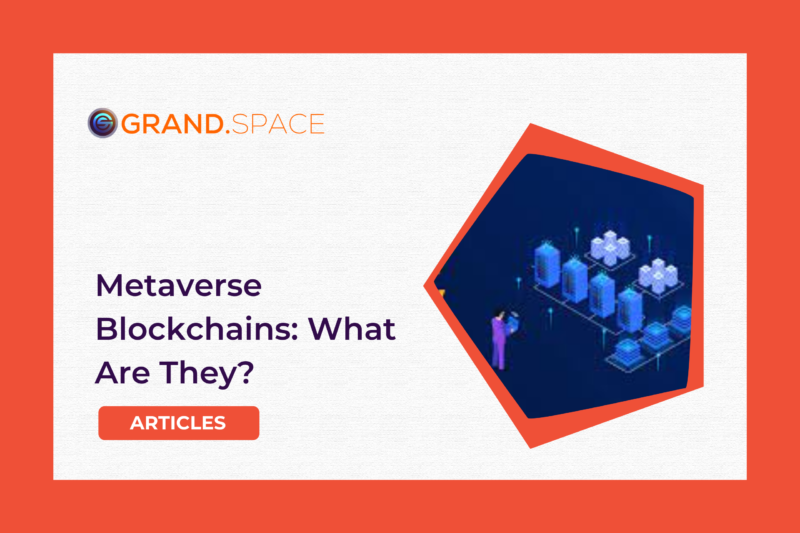With Facebook’s new meta-branding Adidas and Nike developing their own virtual worlds, it’s evident that the metaverse will play an important part in our future. While it is unclear what shape the metaverse for events grasp the core technologies that will fuel this $800 billion potential.
You’ve probably heard terms like metaverse blockchain development, and Web3 around interchangeably, regardless of your employment or background. It is critical to emphasize that this is erroneous because these are two entirely different notions. To go deeper into the three’s relationship, we must first grasp what metaverse blockchain is and how it operates.
What is Metaverse Blockchain?
A metaverse blockchain is a distributed ledger of digital documents known as blocks that exist across a network of nodes or distributed computers. These nodes connect with one another to form a decentralized network capable of exchanging data and performing peer-to-peer transactions autonomously. Unlike centralized systems, the blockchain cannot be controlled by a single individual or third-party authority.
Unlike anything we’ve seen previously, this produces immutable proof of ownership record. The metaverse blockchain solution is also a key component of Web3, the future generation of the internet based on the main principles of decentralization, trust, permission, and interoperability.
What Is the Metaverse and How Does It Transmits Metaverse Blockchain Technology?
The metaverse is a collection of immersive 3D virtual environments that are intended to change the way people work, shop, study, and communicate with others through the internet. While some metaverse blockchian technology may be accessed via a conventional PC, others necessitate the use of specialized gear such as AR/VR goggles or high-GPU gaming machines. The existing metaverse is still somewhat of a walled garden due to technological constraints in interoperability, or the ability to smoothly link numerous virtual worlds.
So, how does metaverse blockchain come into play?
Simply said, without metaverse blockchain technology, the concept of an interoperable metaverse and the viability of the larger Web3 ecosystem are unattainable. Hosting metaverse events underlying basis by providing the critical technological infrastructure required to disseminate, store, and preserve huge volumes of data. We can store and transport our cash and data between metaverse worlds and decentralized apps by using digital wallets that link to the metaverse blockchain solution.
As we engage in the metaverse blockchain development, all transaction records are saved and time-stamped on the blockchain, where they will be visible to the whole world in perpetuity. This proof-of-ownership is essential for proving ownership of metaverse assets including cryptocurrencies, in-game NFT assets, and digital real estate, collectibles, art, and event tickets.
Metaverse Blockchain Applications
1) Payments Decentralized
Decentralized finance platforms and protocols enable users to send peer-to-peer bitcoin payments, borrow and lend money, and earn interest without the need for a centralized third-party organization or bank.
The metaverse blockchain solution serves as the foundation for all decentralized finance tools and serves as the backbone for metaverse trade. Early applications include NFT marketplaces like OpenSea and virtual retail stores like Decentraland.
2) Gaming in the Metaverse
Much of today’s metaverse blockchain technology is heavily entrenched in gaming, which exists at the intersection of virtual worlds and social interaction. However, unlike conventional gaming, gamification in metaverse may have some in-game value, the metaverse blockchain has opened the door to a new age of play-to-earn interaction.
Play-to-earn gaming, which is based on the concept of digital ownership, rewards players with digital assets (typically crypto currencies or NFTs) that have value in both the metaverse and in real life. The idea is for these assets to be transported and used interoperable across gaming contexts as technology progresses.
Many play-to-earn games, such as Axie Infinity and Crypto Raiders, employ NFTs to represent items that may be sold within the game or on an NFT marketplace for cryptocurrency. NFTs may also be used to purchase tickets to metaverse events and communities.
3) Identity Authentication Powered by Blockchain
The metaverse blockchain technology may be used to store our public identity information as the borders between our physical and digital identities become increasingly blurred. Passports, birth certificates, and driver’s licenses are all examples of identification documents that may be converted into non-transferable NFTs.
We can eliminate fraud and accelerate identity validation procedures by using blockchain to verify proof of identity. Countries such as China and South Korea have already realized the value of digital identification, and have begun to develop blockchain-powered smart cities.
4) Incentives for Creators
The metaverse blockchain solution enables creators to bypass traditional industry gatekeepers and earn more than ever before, thanks to secondary royalty mechanisms encoded into smart contracts.
Take, for example, the music industry. Typically, record labels and streaming services receive a considerable portion of the cash generated by artists’ labor. Music NFTs now let artists sell their music directly to their consumers, giving new financial incentives to both producers and fans.
The metaverse blockchain has single-handedly upended the historical value chains across all creative sectors, including art, publishing, and fashion, by eliminating these centralized third parties.
Step into Grand.Space
While much of the metaverse’s impact on our daily lives remains to be seen, upcoming technologies such as blockchain and NFTs are practically certain to play a significant role.
Grand.Space is pleased to provide Metaverse-as-a-service for the business. We provide adaptive solutions for a variety of use cases, including immersive metaverse blockchain development in which enterprise firms may create digital twins of their offices and retail shops, organize events, and give outstanding digital experiences to both consumers and staff. Ready to look out for our demo? Contact us now.
